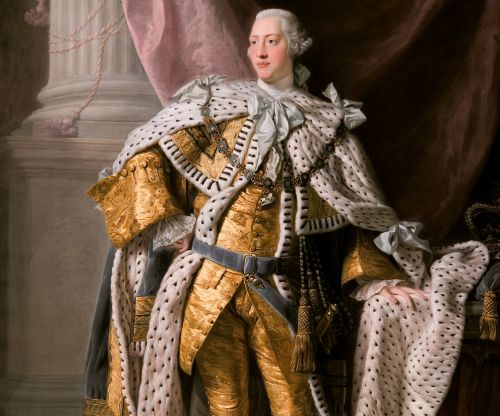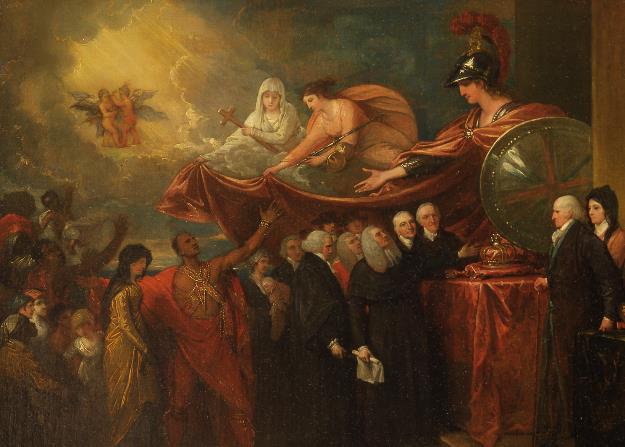

The Revolution’s greatest inheritance was not its victory but its warning, that liberty requires constant rebellion against the impulse to worship power.

By Matthew A. McIntosh
Public Historian
Brewminate
Introduction
When history repeats itself, it doesn’t always march, sometimes it kneels. In the late eighteenth century, tens of thousands of American colonists pledged allegiance not to liberty, but to King George III. They were the Loyalists, men and women who believed rebellion was madness and monarchy was stability, who saw in the Crown not tyranny but order. They were wrong, of course, but their fear of uncertainty kept them chained to a crumbling empire.
Two and a half centuries later, the pattern is back, different throne, same psychology. President Donald Trump commands a loyalty that transcends politics and borders on faith. His followers speak of him not as a man bound by law, but as a figure above it, the only one who can save America from decay. This is less a movement of ideas than of identity, a fusion of self with a leader who defines reality itself.
The comparison is not rhetorical. Trump, like George III, chafes at institutional restraint and mistakes personal power for divine right. His “war on truth” is the modern echo of royal decrees that once silenced dissent. To his loyalists, checks and balances are not constitutional safeguards but betrayals, obstacles to the will of the sovereign they have chosen.
America’s founders risked everything to break from that cycle, to craft a republic where no man would reign above law or reason. Yet in the fever of political idolatry, history’s circle tightens again. The Loyalists of 1776 feared chaos more than chains. The loyalists of today, cloaked in flags instead of red coats, make the same mistake.
The Loyalists of 1776

In the years before independence, America’s first Loyalists were not villains but believers, in order, hierarchy, and the natural authority of the crown. To them, rebellion was chaos masquerading as principle. Figures such as Joseph Galloway of Pennsylvania and Thomas Hutchinson of Massachusetts saw the British Empire as a shield against anarchy. Even William Franklin, the estranged son of Benjamin Franklin, defended King George III as a symbol of stability in a world spinning toward unrest. Their loyalty was rationalized as prudence, their obedience as patriotism.
They called themselves “friends of peace,” but what they sought was comfort, a world ordered by power, not persuasion. The King, they believed, embodied civilization itself. His critics were radicals; his challengers, dangerous idealists. These men and women could not imagine freedom as self-government, only as the privilege to serve under a benevolent ruler. And so they stood on the wrong side of history, protecting a system that saw them as subjects, not citizens.
The echoes today are unmistakable. Trump’s most devoted followers see in him the same fusion of strength and destiny once projected onto George III. They speak of him as a savior misunderstood by lesser men, a ruler besieged by traitors, a figure whose will is the nation’s own. Like the eighteenth-century loyalists, they equate dissent with disloyalty, and in doing so, betray the very principles they claim to defend.
A King in the Republic
President Trump now wields executive power with a monarch’s posture. His administration governs less through deliberation than decree, testing the limits of constitutional restraint with every assertion of “absolute authority.” He dismisses judicial rulings as usurpations, undermines legislative oversight, and replaces civic accountability with personal loyalty. In tone and temperament, he recalls George III: convinced that opposition is rebellion and that the leader’s will is indistinguishable from the will of the nation.
Trump’s vision of government has become intensely personal. Cabinet secretaries, judges, even military officers are measured by fidelity to him rather than to law. He fires those who question him, rewards those who flatter him, and speaks of the presidency not as a duty but as an inheritance. Like George III in the 1770s, he sees himself surrounded by conspirators rather than counselors. The historian’s irony is painful, the republic founded to escape royal dominance now bends beneath the weight of a man who would be king if he could.
And just as the loyalists once defended George’s “rightful” authority against “rebellious agitators,” Trump’s followers rally behind every overreach. They echo his language of grievance, denounce his critics as traitors, and accept his narrative of persecution as truth. What began as politics has hardened into devotion, a creed that places the man above the mandate, the crown above the Constitution.
The Psychology of Devotion
Trump’s hold over his loyalists is not merely political—it’s psychological, even spiritual. The dynamic between Trump and his followers mirrors what psychiatrists call “shared psychosis,” where a dominant personality projects delusions that others adopt as their own. His supporters don’t simply agree with him; they become extensions of him, defending every contradiction as revelation. What began as a movement of voters has evolved into a congregation of believers.
This loyalty operates the same way it did among King George’s subjects. The British monarch, portrayed in sermons and pamphlets as divinely appointed, became the embodiment of national identity. To question him was to question England itself. Trump has achieved a similar fusion in twenty-first-century America: he equates his survival with the nation’s, his enemies with its downfall. In his rhetoric, America First has quietly become Trump First, and for his followers, the two are indistinguishable.
Loyalty of this kind functions less as political alignment than as identity maintenance. To renounce Trump now would mean renouncing the self, admitting that belief was misplaced and that power, not principle, defined the cause. The same moral trap ensnared the Loyalists of 1776, who clung to monarchy long after its legitimacy collapsed. They could not separate their sense of self from the sovereign they served. Today’s loyalists find themselves in the same prison of certainty, one built not of chains, but of conviction.
Modern Loyalists and the Death of Republican Virtue
The defining feature of Trump’s presidency is not his defiance of institutions, but the willingness of others to cheer it on. His loyalists, both in Congress and among the public, treat the erosion of constitutional boundaries as proof of his strength rather than evidence of decay. They celebrate the spectacle of dominance (judges dismissed, journalists attacked, agencies bent to personal will) as if dismantling oversight were patriotic duty. In this theater of loyalty, submission is reframed as courage, and obedience as faith.
That inversion of civic virtue mirrors the logic of America’s first Loyalists. Figures like Joseph Galloway argued that obedience to George III was an act of patriotism, that stability was more valuable than self-determination. Today’s Trump loyalists echo the same creed, mistaking the concentration of power for the preservation of order. They defend a leader who governs by impulse and grievance, convinced that only his authority can restore a mythical past. Their loyalty is not to the republic, but to the image of one man who claims to embody it.
This distortion of republican virtue, the substitution of personality for principle, is the central tragedy of the modern American right. A movement once rooted in constitutional reverence now kneels before executive whim. When Trump invokes “the people,” he does not mean the body politic but the faithful subset who adore him. When he wields “law and order,” it becomes a weapon against his rivals rather than a standard for all. Like George III, he confuses unity with uniformity, imagining that to govern is to command.
The founders understood this danger intimately. They had lived under a king who treated the state as a personal estate, and they built a system meant to prevent another from rising. Yet in the fever of partisanship, Trump’s loyalists have undone that vigilance, offering their consent to royalism wrapped in populist flags. They call it patriotism, but it is the very submission the Revolution was meant to end.
The Cost of Subservience
History is unkind to those who mistake servitude for safety. The Loyalists of the eighteenth century learned that too late. When the Revolution prevailed, thousands fled to Canada, England, or the Caribbean, stripped of property and identity. They had defended a power that no longer recognized them and a monarch who saw them as expendable once the colonies were lost. Their reward for loyalty was exile and erasure, a reminder that blind allegiance binds its followers to the fate of their master, not to the enduring principles of justice or liberty.
The same moral peril shadows Trump’s America. His most ardent loyalists have tethered their reputations, livelihoods, and faith to a man who prizes submission above integrity. Civil servants dismissed for dissent, lawmakers shamed for independence, journalists vilified for inquiry, all mark the decay of civic courage. To question the leader is to invite banishment from the tribe. And so, as under George III, fear becomes the coin of loyalty, and silence its virtue.
But subservience carries another cost: the corrosion of collective reason. When loyalty replaces accountability, truth bends to will, and law becomes spectacle. Trump’s continued campaign against institutions (the courts, the press, the electoral system) has bred an atmosphere where loyalty itself is the measure of belonging. His followers repeat his falsehoods not because they are deceived, but because they have made belief a test of identity. That is how free citizens become subjects.
In the end, even kings fall. Power built on devotion, not law, consumes itself. The Loyalists of 1776 found that out when their monarch’s authority collapsed under the weight of his own obstinacy. Trump’s reign, too, rests on the fragile foundation of personality, and when it breaks, as all cults of power eventually do, the loyal will once again be left with nothing but the wreckage of their faith.
The Lessons of 1776
The Revolution that birthed the United States was, at its core, a rejection of inherited power. It was not merely a war for independence but a philosophical revolt against the idea that authority descends from a single figure: divine, royal, or otherwise. The founders sought to replace that vertical chain of command with a horizontal covenant of law. They envisioned a republic where citizenship, not subjugation, defined belonging, and where government derived its legitimacy from consent, not fear. In declaring that “all men are created equal,” they declared that no man, however adored, could ever stand above the rest.
Yet two and a half centuries later, America finds itself tempted by monarchy again, this time dressed in populist clothing. President Trump, crowned by devotion rather than coronation, presides over a movement that treats his instincts as doctrine and his grievances as gospel. His allies in Congress and the press defer to his authority as if dissent itself were treason. The trappings of democracy remain (elections, legislatures, courts) but their spirit wanes under the weight of his cult of personality. Like the Loyalists who once knelt before George III, his followers call their obedience patriotism and their submission strength.
What makes this repetition so dangerous is its emotional logic. The Loyalists of the eighteenth century feared chaos more than tyranny; they saw rebellion as reckless and monarchy as safe. Trump’s America has inherited that same psychology. His supporters defend the concentration of power as a defense against disorder, mistaking control for stability and domination for leadership. The founders understood that this confusion was fatal to liberty. The moment citizens equate freedom with obedience, they cease to be citizens at all.
But the tragedy is not only theirs. A republic that tolerates such loyalty begins to rot from within. Institutions built to balance power weaken under the strain of one man’s ego. Public discourse collapses into theater, truth becomes performance, and governance turns into ritual flattery. The Revolution’s legacy (government by reason, accountability, and shared responsibility) gives way to the oldest form of governance in human history: rule by the loudest voice. It is a regression disguised as revival.
The founders knew that republics do not die by invasion but by surrender. They decay when citizens trade the hard work of freedom for the comfort of servitude. In their time, the Loyalists clung to a king who called himself their protector. In ours, the new Loyalists cheer a president who calls himself the same. The lesson of 1776 endures: a people who forget how to stand will always find someone eager to rule.
Conclusion: The Republic Remembered
The Revolution’s greatest inheritance was not its victory but its warning, that liberty requires constant rebellion against the impulse to worship power. The founders built a system meant to outlast kings by dividing authority among citizens who would hold one another accountable. It was imperfect and hypocritical, but its aspiration was radical: to create a nation where the governed would never again be subjects. Every oath of office, every peaceful transfer of power, every lawful dissent has been an echo of that founding defiance.
Trump’s presidency tests whether that defiance still lives. Surrounded by sycophants and sustained by a base that measures truth by loyalty, he has turned governance into personal theater. His daily proclamations and attacks on institutions recall the decrees of George III, who mistook criticism for conspiracy. The difference is that Trump’s stage is global, his audience digital, and his reach unrestrained by the courtiers or parliaments that once tempered monarchy. What George III exercised by divine right, Trump wields by media spectacle and grievance. Both rule through the same narcotic, the promise that obedience brings order.
But America’s story was never meant to be one of obedience. The spirit of 1776 survives only when citizens remember that freedom is a practice, not a possession. It lives in questioning authority, in defending truth even when it is inconvenient, and in refusing to confuse patriotism with submission. The Loyalists of old faded into history because their allegiance was to a man rather than to an idea. If today’s Americans forget that distinction, the republic they inherited will endure only as ritual, the ceremony of freedom without its soul.
Originally published by Brewminate, 11.07.2025, under the terms of a Creative Commons Attribution-NonCommercial-NoDerivatives 4.0 International license.


